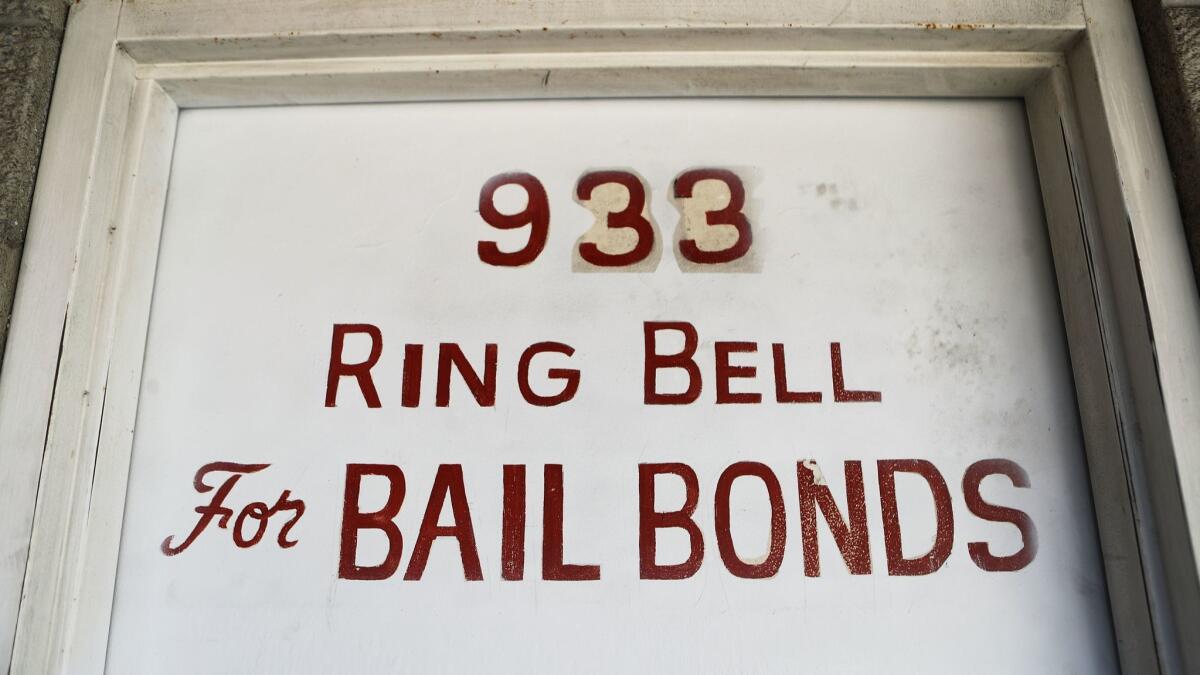Column: Even if they lose, backers of California’s bail industry may help themselves by going to the ballot in 2020

- Share via
The referendum, which voters can use to rescind a law passed by their elected officials, is a rarely used item in California’s direct democracy toolbox. But if more businesses do what the state’s bail bonds industry is now attempting, the referendum could grow into a powerful pushback on Democrats who have firm control over the levers of power in Sacramento.
Last week, a consortium of bail bonds companies filed paperwork with the state attorney general’s office to put Senate Bill 10 up to a vote of the electorate. The bill, signed just one day earlier by Gov. Jerry Brown, would end California’s cash bail system for criminal defendants in the early fall of 2019.
Supporters and opponents agree: The new law is an existential threat to bail companies, a plan to put them out of business. And so the referendum was a no-brainer.
Bail companies need 365,880 valid voter signatures to earn a place on the ballot, a historically low bar that’s led to long lists of ballot propositions in 2016 and 2018. The hardest part of a referendum is that signatures must be submitted within 90 days of the governor’s signing of the law in question.
A quiet and important fight is brewing over how much must be spent on California’s schools »
Ballot measure strategists expect bail companies would need to spend around $3 million to make this happen. But compare that to estimates from bail company advocates of a California industry that generates perhaps 30 times that amount every year, and the referendum is a pretty good bargain.
It’s an even better use of their money when you consider the other aspect of how a referendum works: It suspends the enactment of the law in question. While it’s possible the SB 10 referendum could appear on this November’s ballot, the most likely scenario is that a successful effort goes to voters in 2020. That would mean the earliest the law could take effect, assuming voters sided with the Legislature and Brown, would be two years from this December.
The delay would give bail companies time to pursue legal action against SB 10, as some have suggested it may run afoul of the U.S. Constitution. At minimum, it would ensure bail companies remain in business for another two years.
The strategy is similar to one used by the plastic bag industry in 2014. When Brown signed the law banning single-use bags in most California stores, the industry spent $2.8 million to place the issue on the 2016 ballot as a referendum, Proposition 67. Voters refused to reject the law, but the delayed implementation gave plastic bag manufacturers a softer landing than they would have otherwise had.
And there’s always a chance the bail industry wins on election day. The message of their campaign, which would undoubtedly seek to portray the pre-trial release of some criminal defendants as dangerous, could align closely with a different criminal justice measure that’s already earned a spot on the fall 2020 ballot — one seeking to roll back some of the parole eligibility created by Brown’s Proposition 57 in 2016.
Government reformers have long argued the referendum could be the most valuable form of direct democracy because it serves as a check on the power wielded by the Legislature and governor. But it’s an opportunity that, given the cost of collecting signatures and running campaigns, is largely available only to influential interest groups.
As such, the referendum seems best suited to big industries that can account for qualifying a ballot measure and thus lengthening the law-making process as little more than the cost of doing business in the Golden State. And that alone could usher in a fascinating new era for California’s tendency to govern at the ballot box.
Follow @johnmyers on Twitter, sign up for our daily Essential Politics newsletter and listen to the weekly California Politics Podcast
More to Read
Get the L.A. Times Politics newsletter
Deeply reported insights into legislation, politics and policy from Sacramento, Washington and beyond. In your inbox twice per week.
You may occasionally receive promotional content from the Los Angeles Times.











